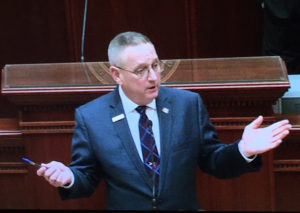
© 2017 by Steve Brawner Communications, Inc.
There was a moment this past week when the Arkansas Medical Marijuana Amendment, approved by 53 percent of the voters in November, looked like it might effectively die in the Arkansas House of Representatives.
On Tuesday, Rep. Doug House, R-North Little Rock, presented that chamber the first two of a number of bills meant to fix problems with the amendment, which the Legislature can do with a two-thirds vote.
One of the bills, House Bill 1058, modified a section of the amendment requiring physicians to certify that marijuana’s benefits would outweigh the harm to a particular patient, after which the Department of Health would give the patient a card letting them purchase the drug. That kind of language puts physicians in jeopardy of being sued because there’s no accepted national standard for the use of marijuana, which remains illegal in the United States. So under House’s bill, the physician would merely certify that a patient has one of the conditions that qualify for use of the drug under the amendment.
House told his fellow legislators that few doctors will be willing to qualify their patients for the drug unless this part of the amendment is changed.
Which is exactly what some representatives wanted to happen. A couple questioned House about whether or not federal law trumps state law (it does) and what would happen if the bill did not pass. A couple argued that people had voted for this particular amendment with this exact wording. House said they had voted for legalizing medical marijuana, and the Legislature ought to make this minor change to accommodate that.
Remember, the bill needed a two-thirds vote to pass. Watching from the press’s perch in the House gallery, I thought it might fail. If it did, voters might have voted for legalized medical marijuana, but patients would have a much harder time obtaining it.
It passed with three votes to spare, 70-23, and will be considered in the Senate next week.
I voted against the amendment in November but found myself rooting for the bill to pass. Arkansans voted for it, after all, so let’s move forward. At the same time, I don’t blame the legislators who voted against it, even though it could be argued they were trying to thwart the election’s results by not fixing the flaw.
All lawmakers must balance their constituents’ wishes with their own convictions; otherwise, they’d be merely pollsters. They should listen but also lead, keeping their eyes and ears on their districts without simply sticking their fingers in the wind. The Founding Fathers were right to create a model described by Benjamin Franklin not as a direct democracy but as “A republic, if you can keep it.”
For Rep. House, that tension is especially complicated because he opposed the amendment and even donated money to help defeat it. But he also believes the voters have made their will known, and so the Legislature must now ensure the drug is available to the people who might benefit from it – and only to them. Moreover, two months before the election, Speaker Jeremy Gillam, R-Judsonia, asked him to manage the Legislature’s response if the amendment passed. A retired National Guard colonel, House dutifully accepted the assignment and then, after the election, began looking for problems to solve, finding 135 of them. So he’s trying to solve them.
House argues in this case, legislators must enact the people’s will because the people won’t accept anything else. Marijuana is now legal in some form in 26 states and the District of Columbia. In 2012, Arkansas voters surprised the political establishment by almost passing another medical marijuana measure. When that happened, the establishment should have acted to address that rising demand, he said. When it didn’t act, the voters acted instead.
“If we sabotage the amendment where people are not able to get the product legally, I fully expect a petition to be generated among the people to enact a constitutional amendment which totally decriminalizes marijuana,” including for recreational purposes, he said in an interview.
In other words, he’s trying to ensure an amendment passed by the people works in the real world, lest those voters produce another that really violates his convictions. It’s not a perfect republic, but it’s one we can keep.
Incidentally I have been ordering top ten personal loan lenders and Cialis not for the first month.